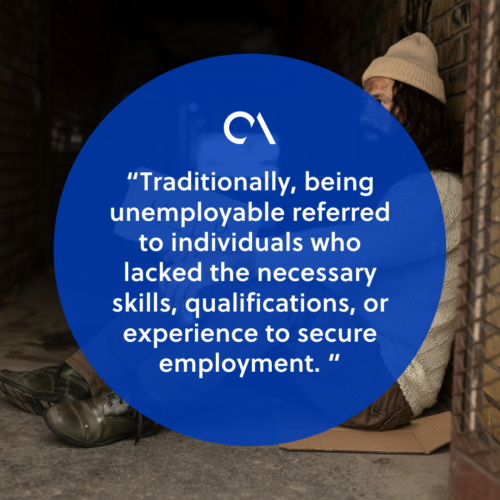Understanding the concept of “unemployable”

Have you ever felt a pang of insecurity when hearing the term “unemployable”? It’s a loaded word that often carries a negative connotation, hinting at individuals deemed unfit for the workforce due to a lack of skills or the right mindset.
But what if I tell you that the concept of being unemployable is evolving? The rules of employment are constantly shifting, and the idea of being classified as unemployable may not be as clear-cut as it seems.
Let’s delve into this intriguing topic and uncover the nuances behind the term “unemployable.”
The traditional definition of being unemployable
Traditionally, being unemployable referred to individuals who lacked the necessary skills, qualifications, or experience to secure employment.
It typically implied that their attributes and capabilities were not aligned with the demands of the job market, making it challenging for them to find suitable employment.
Additionally, the term often carried negative connotations. It frequently suggests that these individuals may have behavioral or skill issues that hinder their chances of getting hired or keeping a job.
Overall, being traditionally unemployable implied a perceived inadequacy in meeting the expectations and requirements of employers in a competitive job market.

What makes a person unemployable?
There are several factors that can contribute to a person being perceived as unemployable, including:
- Lack of relevant skills or qualifications. This can include technical skills, educational credentials, or specific certifications that are crucial for success in a given role or industry.
- Limited adaptability or willingness to learn. Individuals who resist change, are unwilling to learn new technologies or methodologies, or demonstrate resistance to professional development may struggle to find and retain employment.
- Poor work ethic or attitude. Factors such as poor communication skills, an inability to work effectively in a team, or conflict resolution problems can all contribute to a person being viewed as unemployable.
- Lack of experience. A limited professional track record can lead to an individual being overlooked for certain roles. Without tangible work experience in a particular field, individuals may be seen as unemployable for positions that require a demonstrated history of success in similar roles.
- Criminal record or ethical concerns. This is particularly true for roles that require a high level of trust, responsibility, or involvement with vulnerable populations.
It’s important to note that the perception of being unemployable is subjective and can vary depending on the specific industry, job market conditions, and individual employer preferences.
Additionally, societal biases and systemic barriers can also contribute to classifying individuals as unemployable. These all highlight the need for a more inclusive and empathetic approach to assessing an individual’s potential for employment.
What is “unemployable”?: Redefining the term
As the job market has evolved, so has the term “unemployable.”
The term “unemployable” has evolved to encompass individuals who may possess skills and qualifications. Still, they face barriers in securing employment due to various factors, such as changing job market demands, structural inequalities, and shifting societal norms.
In the context of young adults, the term has been associated with the concept of “NEETs” (Not in Education, Employment, or Training) and “new unemployables.” The terms emphasize the challenges faced by a segment of the population in finding work.
This shift in meaning acknowledges that being considered unemployable is not solely dependent on an individual’s qualifications or skills.
Rather, it also takes into account broader socio-economic factors and systemic issues that impact one’s ability to gain meaningful employment.
The term now reflects a more nuanced understanding of the complexities surrounding employability.
Addressing the new unemployables
Addressing the new meaning of “unemployable” requires a multifaceted approach that considers the unique barriers faced by individuals in securing employment.
Here are six strategies you can take going forward:
1. Skills development and training
Provide opportunities for skills development and training programs that equip individuals with the necessary competencies sought by employers.
This can include technical skills, soft skills, and industry-specific knowledge to enhance employability.
2. Career guidance and counseling
Offer career guidance and counseling services to help individuals identify their strengths, interests, and career goals. This can assist in creating personalized career pathways and exploring alternative employment opportunities.

3. Support services
Establish support services such as mentorship programs, job placement assistance, and networking opportunities.
These can help individuals overcome barriers to employment and navigate the job market successfully.
4. Addressing systemic barriers
Advocate for policies and initiatives that address systemic barriers to employment, such as discrimination, lack of access to education and training, and inequities in the labor market. Promote diversity, equity, and inclusion in hiring practices to create more inclusive workplaces.
5. Collaboration and partnerships
Foster collaborations and partnerships between government agencies, educational institutions, employers, non-profit organizations, and community stakeholders.
Involving different groups creates a coordinated approach to address the challenges faced by individuals deemed unemployable.
6. Empowerment and advocacy
Empower individuals to advocate for themselves and build self-confidence and resilience in the face of employment challenges. Encourage a strengths-based approach that focuses on individuals’ unique abilities and potential contributions to the workforce.
Together, we can work towards a more inclusive and supportive work environment.
We should strive to help individuals overcome barriers to employment and redefine the notion of unemployability in a way that promotes equal opportunities and economic mobility for all.







 Independent
Independent




